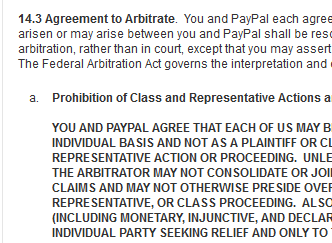PayPal Slips Forced Arbitration Clause Into User Agreement; Gives You Until Dec. 1 To Opt Out Image courtesy of With PayPals like this, who needs enemies?
Here is the section of the updated agreement that deals with class-action suits:
Prohibition of Class and Representative Actions and Non-Individualized Relief.
YOU AND PAYPAL AGREE THAT EACH OF US MAY BRING CLAIMS AGAINST THE OTHER ONLY ON AN INDIVIDUAL BASIS AND NOT AS A PLAINTIFF OR CLASS MEMBER IN ANY PURPORTED CLASS OR REPRESENTATIVE ACTION OR PROCEEDING. UNLESS BOTH YOU AND PAYPAL AGREE OTHERWISE, THE ARBITRATOR MAY NOT CONSOLIDATE OR JOIN MORE THAN ONE PERSON’S OR PARTY’S CLAIMS AND MAY NOT OTHERWISE PRESIDE OVER ANY FORM OF A CONSOLIDATED, REPRESENTATIVE, OR CLASS PROCEEDING. ALSO, THE ARBITRATOR MAY AWARD RELIEF (INCLUDING MONETARY, INJUNCTIVE, AND DECLARATORY RELIEF) ONLY IN FAVOR OF THE INDIVIDUAL PARTY SEEKING RELIEF AND ONLY TO THE EXTENT NECESSARY TO PROVIDE RELIEF NECESSITATED BY THAT PARTY’S INDIVIDUAL CLAIM(S). ANY RELIEF AWARDED CANNOT AFFECT OTHER PAYPAL USERS.
And here is the section that details how to opt out. We’ve bolded the most important information:
Opt-Out Procedure.
You can choose to reject this Agreement to Arbitrate (“opt out”) by mailing us a written opt-out notice (“Opt-Out Notice”). For new PayPal users, the Opt-Out Notice must be postmarked no later than 30 Days after the date you accept the User Agreement for the first time. If you are already a current PayPal user and previously accepted the User Agreement prior to the introduction of this Agreement to Arbitrate, the Opt-Out Notice must be postmarked no later than December 1, 2012. You must mail the Opt-Out Notice to PayPal, Inc., Attn: Litigation Department, 2211 North First Street, San Jose, CA 95131.
The Opt-Out Notice must state that you do not agree to this Agreement to Arbitrate and must include your name, address, phone number, and the email address(es) used to log in to the PayPal account(s) to which the opt-out applies. You must sign the Opt-Out Notice for it to be effective. This procedure is the only way you can opt out of the Agreement to Arbitrate. If you opt out of the Agreement to Arbitrate, all other parts of the User Agreement, including all other provisions of Section 14 (Disputes with PayPal), will continue to apply. Opting out of this Agreement to Arbitrate has no effect on any previous, other, or future arbitration agreements that you may have with us.
In response to the eBay TOS change, the folks at Public Citizen wrote the company asking it to rethink this anti-consumer practice of slipping forced arbitration clauses into long and complicated user agreements.
“Even an easily exercised opt-out option — which you are not providing — is an inadequate cure to a forced arbitration contractual requirement,” reads the letter. “The vast majority of users accept standard-form contract language without reviewing or analyzing it; and, most users have no way to appreciate the consequences of agreeing to forced arbitration provisions. It is appropriate for eBay and a user to agree to arbitrate disputes, but that decision should be made after a dispute has arisen, when a consumer is in position to make a reasonable assessment of the benefits and disadvantages of arbitration.”
Citizen.org has a Rogues Gallery of companies with forced arbitration clauses, many of which have jumped on the bandwagon since the U.S. Supreme Court ruled in favor of AT&T in 2011 that a couple of sentences buried among thousands of words in a user agreement — a user agreement that can not be edited or contested if the customer wants service — is sufficient to pre-empt customers from joining in a class-action suit.
Want more consumer news? Visit our parent organization, Consumer Reports, for the latest on scams, recalls, and other consumer issues.


